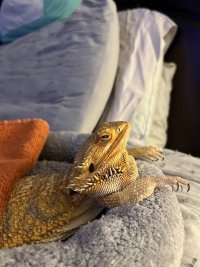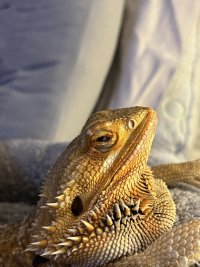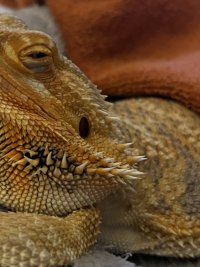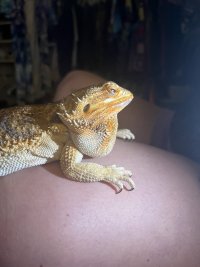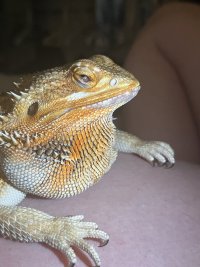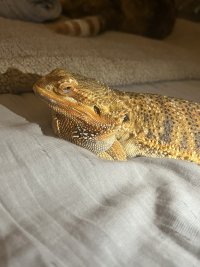Hi everyone, this is my first post on the forum, and hate that it comes in these circumstances.
Booshka (Babushka) has been a part of my life for about a year and a half now, and has appeared to be in good health until now. 3 nights ago (Sunday) when I was saying goodnight to her, I noticed her eyes appeared a little puffy and looked like she was tearing up or about to start crying, if you will. Earlier that day, she was acting totally normal: perky, energetic, hungry. However the following morning, both of her eyes were very swollen (on her skull/top of head) and drooping toward the front corners of her actual eyeballs. Where the drooping is occurring, there appears to be some reddish/brownish discoloration. (Photos attached)
My first thought was she might be about to start her shed. She’s naturally a very vibrant orange, and tends to lose that vibrancy and transition into a grey-ish color as her shed progresses. Monday morning, her beard was pretty black, and the bottom half of her tail appeared darker. Her vibrant orange has sort of dulled out a bit, but doesn’t appear to be transitioning into that grey-ish shed color. It is currently late Wednesday night, and her beard has returned to a normal-ish color, but the bottom half of her tail still seems to be a little darker.
After some initial research, it appears it could be a few things: parasites/mites, Vitamin A issues (too much or too little of it), infection, or injury/irritation. The obvious thing to do would be take her to the vet, and will likely do so tomorrow. However, we took our previous beardie to this “specialty vet” after he tragically fell, and was told that he had a fractured hip and would be fine in no time if we just gave him his “pain medicine” or whatever it was they gave us. And less than 48 hours later, he passed away. I understand the vets are professionals and have a much greater knowledge on these critters than I do, but also understand that they are humans and humans tend to make mistakes. However, as I have never been familiar with beardie biology/anatomy, I was forced to accept the vet’s diagnosis and have faith that they were right. That being said, I reach out to this community as a scared and concerned beardie parent, in hopes to get some input/advice on what to ask the vet.
As I have begun to research beardie health, I’ve realized that I could certainly be doing more to ensure a healthy lizard. My first beardie was a significant other’s, and I naturally assumed the step-parent role. However, I knew nothing about beardies, and up until this week, the majority of knowledge I’ve had about beardies came from that significant other. But I’m starting to realize my irresponsibility from over the years, and believe I could have been doing more to ensure a happy, healthy Booshka.
Booshka’s Living Conditions:
I have always had a general understanding that beardie’s need their sunlight (or basking lamp) and a warm, stable environment. But my research has led me to believe that I haven’t been paying enough attention to those factors. She has a pretty large terrarium (don’t know exact measurements), and uses the “Repti Basking Spot Lamp” (I believe I got her the 100w, but don’t know for sure. I have never known exactly which of wattage would be right for her). Sand covers the bottom of the terrarium, with a little log, a tree, and her favorite part: her hammock. She spends the majority of the day in her hammock, directly underneath the basking lamp. HOWEVER, at night time, we always take her out of her terrarium, and put her in her little cat bed that sits on a warm heating pad. I’m sure this practice is a little unorthodox and have always feared it may be detrimental to her health, but younger me couldn’t justify keeping a sweet lizard locked up over night. She was less than a year old when we got her, and she was itty bitty. We would make her a fresh bowl of lettuce & fruit (blueberries, blackberries, pineapples, carrots) every day, and try to have mealworms on standby as a little protein treat. Early on, it was rare to see food left over in her bowl, and once she got big enough, we introduced her to crickets. Ever since she was introduced to crickets, she shows little to no interest in the salad, and will go on hunger strike until she’s given some crickets or worms. She was in brumation from roughly November until 2-3 weeks ago, and showed signs of her regaining her appetite and energy up until Sunday evening. Booshka was given a generous portion of crickets on Saturday, and ate less than she would have before brumation. I just assumed it was because she was still adjusting and coming out of brumation. Upon research, I’ve learned that not only are crickets sort of a “dirty” meal because they have been known to carry parasites/mites, but they can also injure your beardie if left in the enclosure beyond feeding time. <— that alone has me feeling really guilty because I have been feeding her primarily crickets for the past year, and would always just throw a ton of them in with her to take care of at her leisure.
TO SUM IT ALL UP:
I know this post is longer than some books, but this little lizard has helped me through some tough times by just being alive and next to me. I swear she understands me, and knows when I need to see her little licks and her darting side glances. She is more than a pet and a friend, she’s family. If anyone has read this far, you’re a trooper, and hope you’re able to feel where I’m coming from. Any input/advice would be greatly appreciated.
Booshka (Babushka) has been a part of my life for about a year and a half now, and has appeared to be in good health until now. 3 nights ago (Sunday) when I was saying goodnight to her, I noticed her eyes appeared a little puffy and looked like she was tearing up or about to start crying, if you will. Earlier that day, she was acting totally normal: perky, energetic, hungry. However the following morning, both of her eyes were very swollen (on her skull/top of head) and drooping toward the front corners of her actual eyeballs. Where the drooping is occurring, there appears to be some reddish/brownish discoloration. (Photos attached)
My first thought was she might be about to start her shed. She’s naturally a very vibrant orange, and tends to lose that vibrancy and transition into a grey-ish color as her shed progresses. Monday morning, her beard was pretty black, and the bottom half of her tail appeared darker. Her vibrant orange has sort of dulled out a bit, but doesn’t appear to be transitioning into that grey-ish shed color. It is currently late Wednesday night, and her beard has returned to a normal-ish color, but the bottom half of her tail still seems to be a little darker.
After some initial research, it appears it could be a few things: parasites/mites, Vitamin A issues (too much or too little of it), infection, or injury/irritation. The obvious thing to do would be take her to the vet, and will likely do so tomorrow. However, we took our previous beardie to this “specialty vet” after he tragically fell, and was told that he had a fractured hip and would be fine in no time if we just gave him his “pain medicine” or whatever it was they gave us. And less than 48 hours later, he passed away. I understand the vets are professionals and have a much greater knowledge on these critters than I do, but also understand that they are humans and humans tend to make mistakes. However, as I have never been familiar with beardie biology/anatomy, I was forced to accept the vet’s diagnosis and have faith that they were right. That being said, I reach out to this community as a scared and concerned beardie parent, in hopes to get some input/advice on what to ask the vet.
As I have begun to research beardie health, I’ve realized that I could certainly be doing more to ensure a healthy lizard. My first beardie was a significant other’s, and I naturally assumed the step-parent role. However, I knew nothing about beardies, and up until this week, the majority of knowledge I’ve had about beardies came from that significant other. But I’m starting to realize my irresponsibility from over the years, and believe I could have been doing more to ensure a happy, healthy Booshka.
Booshka’s Living Conditions:
I have always had a general understanding that beardie’s need their sunlight (or basking lamp) and a warm, stable environment. But my research has led me to believe that I haven’t been paying enough attention to those factors. She has a pretty large terrarium (don’t know exact measurements), and uses the “Repti Basking Spot Lamp” (I believe I got her the 100w, but don’t know for sure. I have never known exactly which of wattage would be right for her). Sand covers the bottom of the terrarium, with a little log, a tree, and her favorite part: her hammock. She spends the majority of the day in her hammock, directly underneath the basking lamp. HOWEVER, at night time, we always take her out of her terrarium, and put her in her little cat bed that sits on a warm heating pad. I’m sure this practice is a little unorthodox and have always feared it may be detrimental to her health, but younger me couldn’t justify keeping a sweet lizard locked up over night. She was less than a year old when we got her, and she was itty bitty. We would make her a fresh bowl of lettuce & fruit (blueberries, blackberries, pineapples, carrots) every day, and try to have mealworms on standby as a little protein treat. Early on, it was rare to see food left over in her bowl, and once she got big enough, we introduced her to crickets. Ever since she was introduced to crickets, she shows little to no interest in the salad, and will go on hunger strike until she’s given some crickets or worms. She was in brumation from roughly November until 2-3 weeks ago, and showed signs of her regaining her appetite and energy up until Sunday evening. Booshka was given a generous portion of crickets on Saturday, and ate less than she would have before brumation. I just assumed it was because she was still adjusting and coming out of brumation. Upon research, I’ve learned that not only are crickets sort of a “dirty” meal because they have been known to carry parasites/mites, but they can also injure your beardie if left in the enclosure beyond feeding time. <— that alone has me feeling really guilty because I have been feeding her primarily crickets for the past year, and would always just throw a ton of them in with her to take care of at her leisure.
TO SUM IT ALL UP:
I know this post is longer than some books, but this little lizard has helped me through some tough times by just being alive and next to me. I swear she understands me, and knows when I need to see her little licks and her darting side glances. She is more than a pet and a friend, she’s family. If anyone has read this far, you’re a trooper, and hope you’re able to feel where I’m coming from. Any input/advice would be greatly appreciated.

